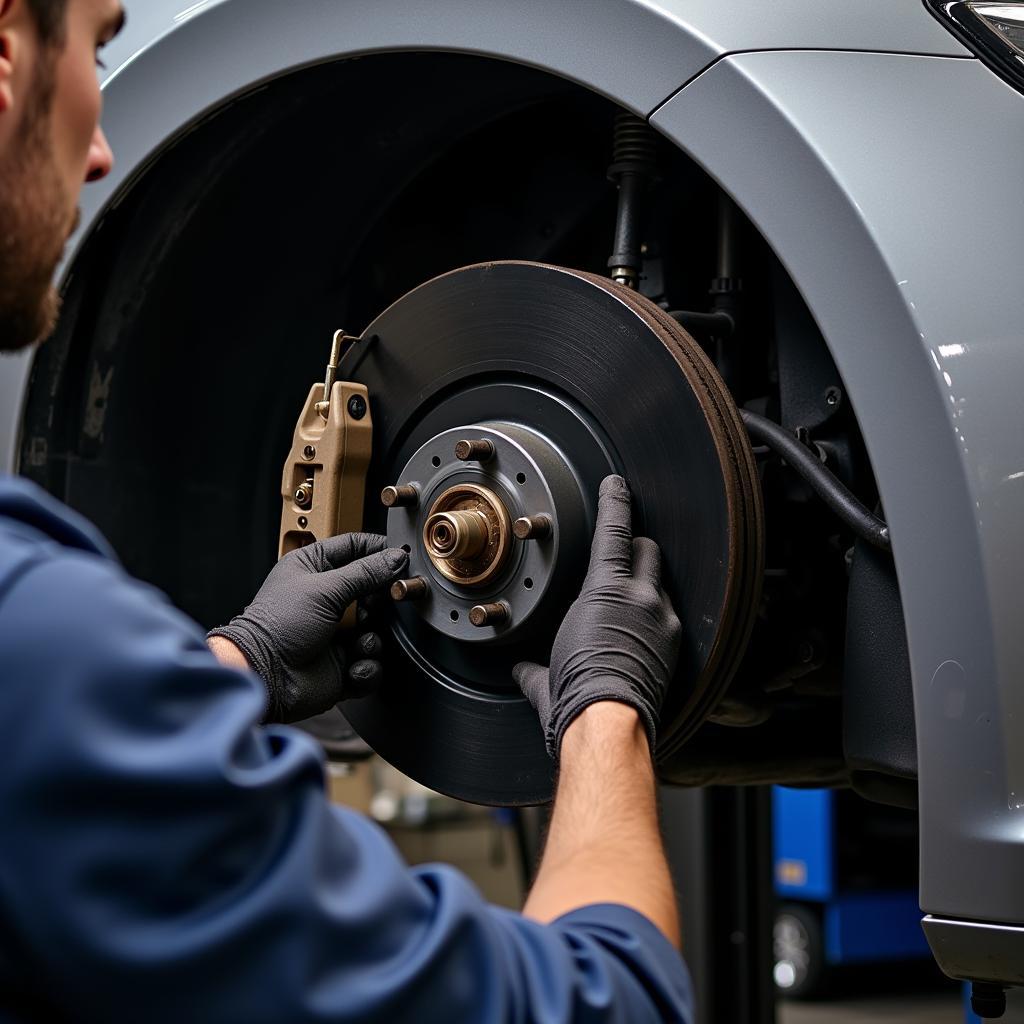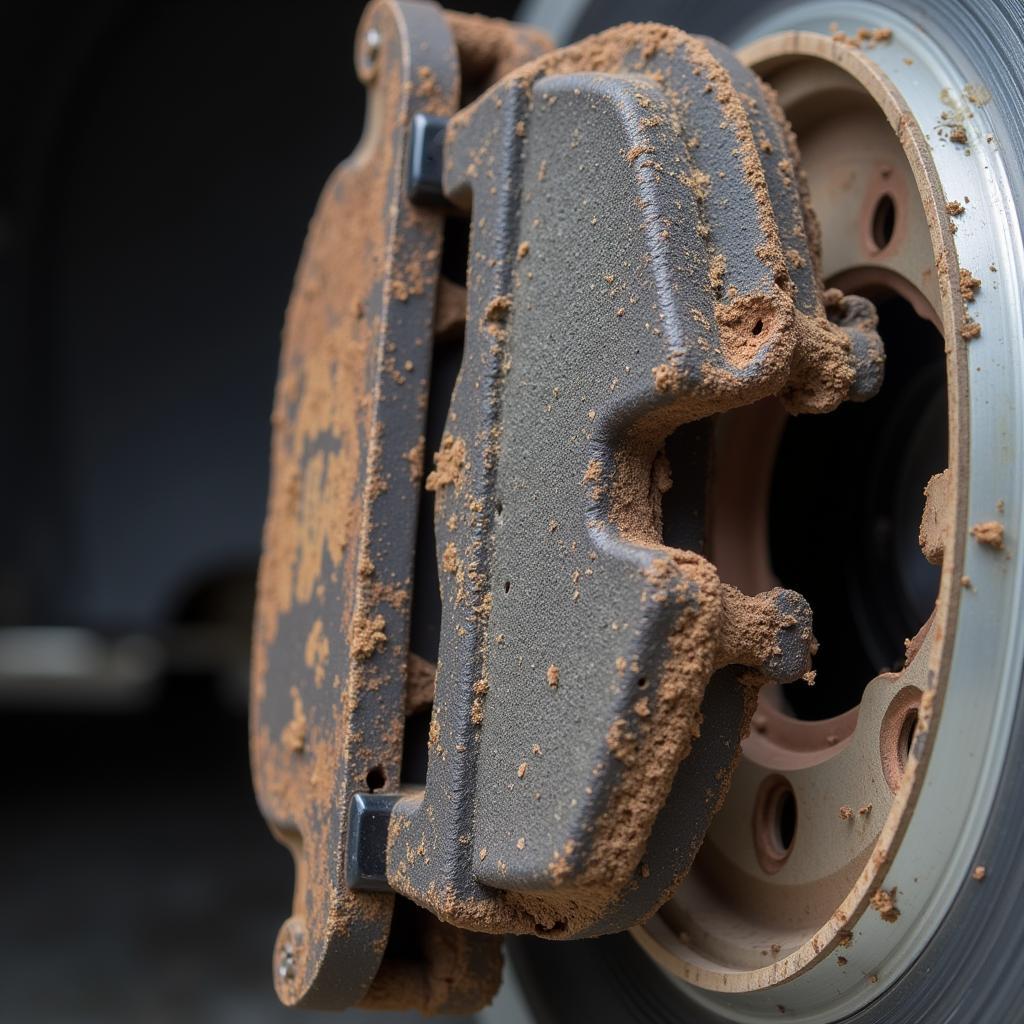The dreaded brake pad warning light – a sight no Passat B5 owner wants to see. But don’t panic just yet! While a glowing brake pad warning light can signal a problem, understanding what triggers it can save you unnecessary stress and potentially costly repairs. This guide will walk you through the common causes of a Passat B5 brake pad warning light, how to diagnose the issue, and offer solutions to get you back on the road safely.
Understanding Your Passat B5’s Brake Pad Warning System
Your Passat B5 utilizes a simple yet effective system to monitor brake pad wear. At the heart of it are small sensors, known as brake pad wear sensors, embedded within the brake pads themselves. These sensors are designed to create a circuit. As the brake pads wear down over time, eventually, the sensor wire makes contact with the brake rotor, breaking the circuit. This break triggers the brake pad warning light on your dashboard.
Common Causes of a Passat B5 Brake Pad Warning
While worn brake pads are the most frequent culprit behind a lit warning light, other factors can also be at play. Let’s explore some of the common causes:
- Worn Brake Pads: This is the most straightforward reason. As brake pads thin, the wear sensor eventually makes contact, triggering the warning light.
- Faulty Brake Pad Wear Sensor: Like any electrical component, the sensor itself can malfunction. A break in the sensor wire or a faulty connection can trigger a false warning.
- Damaged Wiring Harness: The wiring harness connecting the brake pad wear sensor to the vehicle’s electrical system can be susceptible to damage from road debris, corrosion, or general wear and tear, leading to an illuminated warning light.
- Brake Fluid Issues: While not directly linked to the brake pad wear sensor, low brake fluid can also trigger the brake warning light. Always check your brake fluid level as a safety precaution.
Diagnosing the Issue: A Step-by-Step Guide
Before assuming the worst, follow these steps to pinpoint the cause of your Passat B5 brake pad warning light:
- Inspect Your Brake Pads: Begin by visually inspecting your brake pads. If you see less than 1/4 inch of friction material remaining, it’s time for a replacement.
- Check the Brake Pad Wear Sensor: With the wheel removed, carefully examine the brake pad wear sensor. Look for any visible damage, such as a broken wire or loose connection.
- Inspect the Wiring Harness: Trace the wiring harness from the sensor back to where it connects to the vehicle’s electrical system. Look for any signs of damage, such as cuts, fraying, or corrosion.
- Check Your Brake Fluid: Ensure your brake fluid level is within the recommended range as indicated on the reservoir.
Addressing the Problem
The solution to your Passat B5 brake pad warning light depends entirely on the diagnosis:
- Worn Brake Pads: Replace your brake pads with high-quality replacements. It’s recommended to replace pads in axle pairs (both front or both rear) to maintain balanced braking.
- Faulty Brake Pad Wear Sensor: If you identify a faulty sensor, replace it with a new one. These are relatively inexpensive and easy to install.
- Damaged Wiring Harness: Repair or replace any damaged sections of the wiring harness. If unsure, consult a qualified mechanic.
- Low Brake Fluid: Top up your brake fluid with the recommended type for your Passat B5. If you notice a consistent drop in brake fluid level, it’s crucial to have your braking system inspected for leaks by a professional.
When to Seek Professional Help
While diagnosing and addressing the causes of a Passat B5 brake pad warning light can often be a DIY job for those comfortable with basic car maintenance, certain situations call for expert help. If you encounter any of the following, don’t hesitate to reach out to a qualified mechanic:
- You’re Uncomfortable Working on Your Vehicle: Your safety is paramount. If you’re not confident in your mechanical skills, it’s best to leave the diagnosis and repair to a professional.
- You Suspect a Brake Fluid Leak: A brake fluid leak is a serious safety hazard. Have your braking system inspected and repaired by a qualified mechanic immediately.
- You’ve Replaced the Brake Pads and Sensor, but the Light Persists: This could indicate a more complex electrical issue that requires professional diagnosis and repair.
 Mechanic Inspecting Passat B5 Brakes
Mechanic Inspecting Passat B5 Brakes
Tips to Prevent Future Brake Pad Warning Light Issues
Prevention is always better than cure. Here are some proactive measures to keep your Passat B5’s brakes in top condition and minimize the chances of encountering the brake pad warning light:
- Adhere to a Regular Brake Inspection Schedule: Aim for a brake inspection at least once a year or every 12,000 miles, whichever comes first.
- Be Mindful of Your Driving Habits: Aggressive driving with frequent hard braking can accelerate brake pad wear.
- Use High-Quality Brake Pads: Investing in reputable brake pads ensures optimal performance and longevity.
- Address Brake Issues Promptly: Ignoring any brake-related concerns can lead to more significant and costlier problems down the line.
Conclusion
A glowing brake pad warning light in your Passat B5 shouldn’t be ignored. By understanding the common causes, following a systematic diagnostic approach, and addressing the issue promptly, you can ensure your safety on the road and potentially save yourself from costly repairs in the future. Remember, when in doubt, always consult a qualified mechanic.
FAQ
Q1: Can I drive my Passat B5 with the brake pad warning light on?
It’s strongly discouraged. Driving with worn brake pads or a faulty brake system compromises your safety and can lead to further damage.
Q2: How much does it cost to replace brake pads on a Passat B5?
The cost varies depending on factors like location, make and model of brake pads, and labor rates.
Q3: How often should I replace my Passat B5’s brake pads?
Brake pad lifespan varies depending on driving habits and conditions. However, a general rule is to replace them every 30,000 to 70,000 miles.
Q4: Where can I buy Passat B5 brake pads?
You can purchase brake pads from auto parts stores, online retailers, or dealerships.
Q5: Can I replace my Passat B5’s brake pads myself?
If you’re comfortable with basic car maintenance, replacing brake pads can be a DIY job. However, if unsure, it’s always recommended to seek professional help.
For more specific guidance on the Passat B5.5 brake pad warning light or the B5 Passat brake pad warning harness, you can refer to our dedicated articles on those topics.

